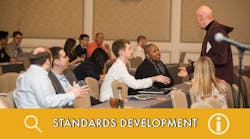Building upon the research expansion taking place in the Solid-State Lighting Program at Rensselaer’s Lighting Research Center, the LRC’s biannual LED Lighting Institute is also expanding its horizons.
Beginning with the next course, scheduled for November 15-17, 2016, at the LRC in Troy, New York, this 3-day seminar for industry professionals covering the latest advances in LED and solid-state lighting (SSL) technology will include new content related to connected lighting and 3D printing—two up-and-coming fields where the SSL industry can add value and reap benefits for producers and users.
Beginning with the next course, scheduled for November 15-17, 2016, at the LRC in Troy, New York, this 3-day seminar for industry professionals covering the latest advances in LED and solid-state lighting (SSL) technology will include new content related to connected lighting and 3D printing—two up-and-coming fields where the SSL industry can add value and reap benefits for producers and users.
In the past year, the LRC has set a course to support the SSL industry through research that shows the value of lighting beyond energy savings. Embracing the trends toward customization and data analytics, SSL research is now evolving to include new developments such as networked/connected lighting, made possible through the Internet of Things (IoT), and 3D printing of lighting components. The LED Lighting Institute will highlight these growing trends in the SSL marketplace and help participants learn more about state-of-the-art research in these fields.
With the core component of this course being LED and OLED technology, those who attend the LED Lighting Institute will learn the best methods for incorporating LEDs and OLEDs into architectural lighting fixture designs and lighting systems, and compare system components from a wide variety of manufacturers to determine operating characteristics, rated life, lumen output, distribution, and other important specification factors. The program culminates with participants designing, building, and evaluating their own lighting fixtures.
This intensive workshop continues to grow in popularity, so early registration is recommended as enrollment is limited to 30 students. Those who sign up by November 1 will receive a discount on the registration fee. More than 800 people from around the globe have completed the course, which is held in spring and fall each year.
Participants will earn 22.25 American Institute of Architects (AIA) Health, Safety, Welfare Learning Units (LUs/HSW) for attending the LED Lighting Institute. Participants also earn Continuing Education Units (CEUs) and will receive a Continuing Education Certificate in LED Lighting from the LRC. The LED Lighting Institute is eligible for LEED and NCQLP maintenance credits.
For more information or to register, visit: http://www.lrc.rpi.edu/education/outreachEducation/InHouseInstitute.asp
About the Lighting Research Center
The Lighting Research Center (LRC) at Rensselaer Polytechnic Institute is the world's leading center for lighting research and education. Established in 1988 by the New York State Energy Research and Development Authority (NYSERDA), the LRC has been pioneering research in solid-state lighting, light and health, transportation lighting and safety, and energy efficiency for nearly 30 years. LRC lighting scientists with multidisciplinary expertise in research, technology, design, and human factors, collaborate with a global network of leading manufacturers and government agencies, developing innovative lighting solutions for projects that range from the Boeing 787 Dreamliner to U.S. Navy submarines to hospital neonatal intensive-care units. LRC researchers conduct independent, third-party testing of lighting products in the LRC's state of the art photometric laboratories, the only university lighting laboratories accredited by the National Voluntary Laboratory Accreditation Program (NVLAP Lab Code: 200480-0). In 1990, the LRC became the first university research center to offer graduate degrees in lighting and today, offers a M.S. in lighting and a Ph.D. to educate future leaders in lighting. With 35 full-time faculty and staff, 15 graduate students, and a 30,000 sq. ft. laboratory space, the LRC is the largest university-based lighting research and education organization in the world.
About Rensselaer Polytechnic Institute
Rensselaer Polytechnic Institute, founded in 1824, is America’s first technological research university. The university offers bachelor’s, master’s, and doctoral degrees in engineering; the sciences; information technology and web sciences; architecture; management; and the arts, humanities, and social sciences. Rensselaer faculty advance research in a wide range of fields, with an emphasis on biotechnology, nanotechnology, computational science and engineering, data science, and the media arts and technology. The Institute has an established record of success in the transfer of technology from the laboratory to the marketplace, fulfilling its founding mission of applying science “to the common purposes of life.”
Contact:
Rebekah Mullaney, Manager, Research Communications - Lighting Research Center, Rensselaer Polytechnic Institute+1 518.687.7118
E-mail:
[email protected]Locate more lighting controls vendors in the LEDs Magazine Suppliers Directory
Submit new products, case studies/projects, and other press releases at http://www.ledsmagazine.com/content/leds/en/addcontent.html.
More from Lighting Research Center:
Lighting Research Center expands SSL research capabilities to connected lighting, 3D printing
Lighting Research Center doctoral students, research scientists present at SPIE Conference
Submit new products, case studies/projects, and other press releases at http://www.ledsmagazine.com/content/leds/en/addcontent.html.
More from Lighting Research Center:
Lighting Research Center expands SSL research capabilities to connected lighting, 3D printing
Lighting Research Center doctoral students, research scientists present at SPIE Conference




